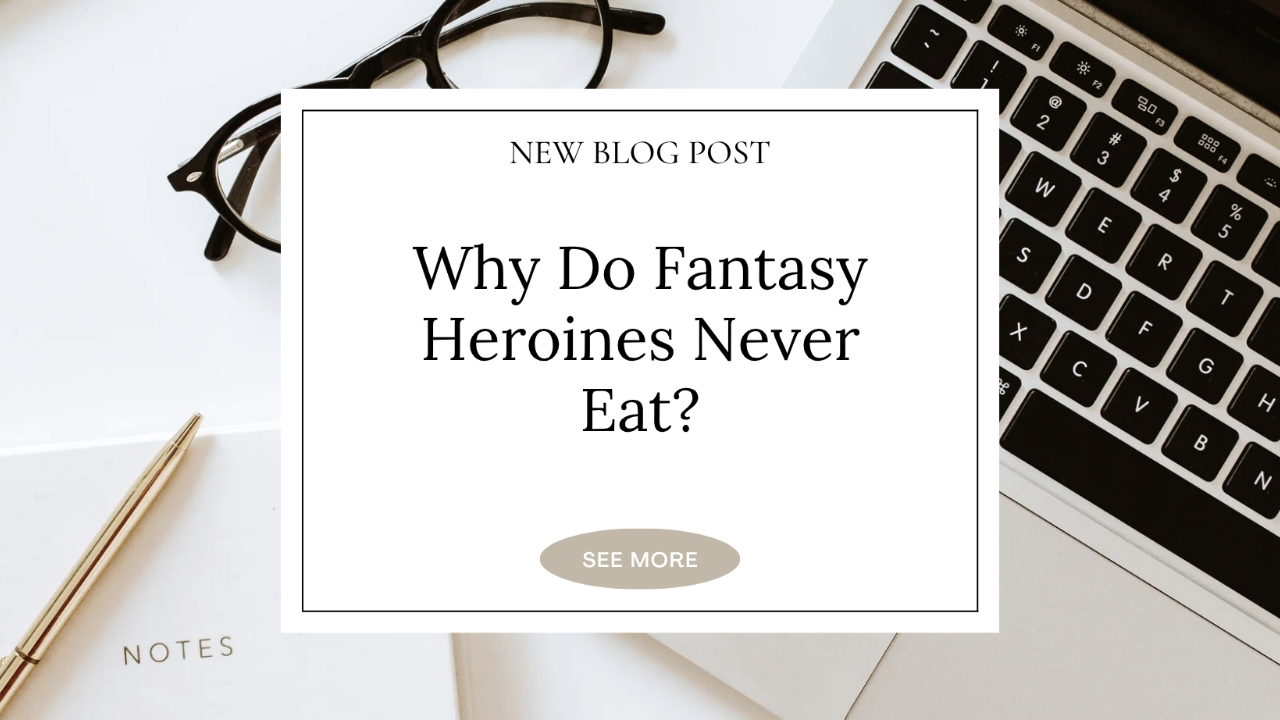Why Do Fantasy Heroines Never Eat?
Oct 07, 2025
Why Do Fantasy Heroines Never Eat?
Have you ever noticed that in fantasy novels, the heroine — fierce, brave, world-saving — somehow never eats?
She’ll battle monsters, trek across kingdoms, survive near death… but food? Barely mentioned. And when it is, it’s fleeting. A few crumbs of bread. A sip of ale. A feast described in detail — yet she barely touches it before something interrupts.
It’s as if hunger itself is unworthy of her story.
The Unspoken Rule: Hunger Isn’t Heroic
We’ve all internalised it: the “ideal” woman doesn’t need much.
Not food.
Not rest.
Not comfort.
She is light, contained, and disciplined. She conquers worlds on an empty stomach — because needing anything would make her less.
When heroines are written as women who forget to eat, it isn’t a creative oversight — it’s cultural conditioning. It mirrors what women have been told for centuries: that desire, appetite, and need are shameful. That the “strong” woman is the one who suppresses herself the most.
The Feast-or-Famine Fantasy
And when hunger is acknowledged, it’s always when it’s too late — when the heroine is faint, dizzy, on the verge of collapse.
Then, suddenly, she’s surrounded by abundance: overflowing tables, royal banquets, grand feasts.
But just as she lifts a fork, something happens.
A fight breaks out. A messenger arrives. A betrayal unfolds.
Her appetite disappears. Again.
She’s allowed hunger only when it’s noble suffering — and fullness is always interrupted.
So we’re left asking: Can a heroine save the world and have a full stomach?
Or has even fiction decided that strong women can’t be nourished ones?
The Deeper Psychology
When women are depicted as detached from hunger, it reinforces a dangerous story — that to be worthy, we must rise above our bodies.
That to be admirable, we must shrink — in appetite, in space, in emotion.
But hunger is one of the most human experiences we have. It connects us to life, to energy, to the primal rhythm of existence. To strip heroines of hunger is to strip them of humanity.
It teaches readers — especially young women — that to be “heroic” is to be weightless. That fullness, in any form, is too much.
The Cultural Mirror
What’s more concerning?
That this is what’s socially acceptable, sellable, and palatable to readers across the world?
Or that even female authors — women with the power to challenge this narrative — rarely do?
It’s as if we’ve collectively agreed that female power must always be tempered by restraint. Even in fantasy, where dragons exist and magic is real, women are still not allowed to eat freely.
What Real Strength Looks Like
Imagine a different kind of heroine.
One who eats heartily after battle, who tears bread with her hands, who laughs with her mouth full, who allows herself pleasure, nourishment, and abundance — not as a reward, but as a right.
That would be the true revolution.
Because a woman who eats, and still dares to lead, disrupts the oldest story of all: that hunger makes us dangerous, and therefore must be silenced.
Final Thoughts
The fantasy heroine who never eats isn’t just fiction. She’s a reflection of what the world still finds acceptable — women who are powerful, but never too much.
But here’s the truth: hunger, in every form, is sacred.
Your appetite — for food, for rest, for life — is not a flaw to be edited out of your story.
Because the real heroine doesn’t conquer hunger.
She honours it.
✨ Maybe it’s time we stop writing women who can save the world on an empty stomach — and start celebrating those who do it nourished. Please send me any recommendations of fantasy novels- where they eat.
Love Didi x
Consider 1:1 Nutrition Coaching with me now to unlock your full potential
Stay connected with news and updates!
Join my mailing list to receive the latest news and updates.
Don't worry, I hate spam too.
I hate SPAM. I will never sell your information, for any reason.

